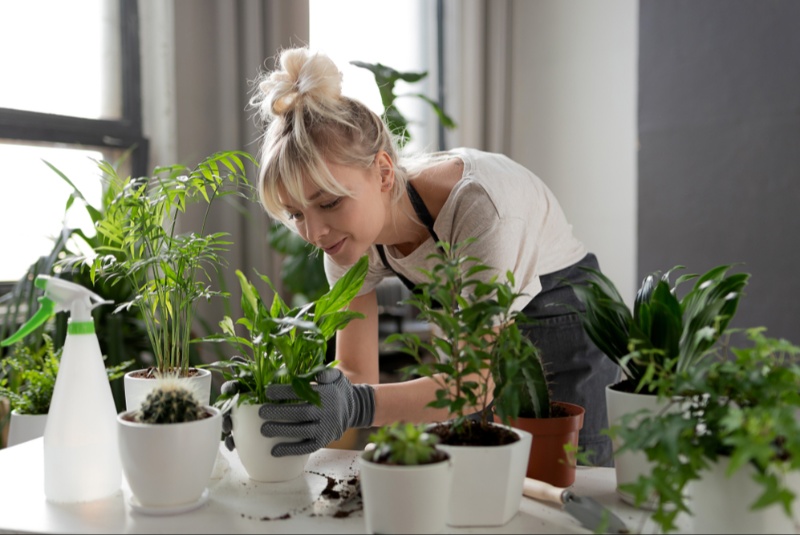In today's fast-paced world, finding ways to improve our overall well-being is more important than ever. From mindfulness practices to exercise routines, people are constantly seeking ways to enhance their quality of life. One often overlooked method of boosting health and happiness lies right in our own homes and offices: indoor plants. While they may seem like simple decorative pieces, indoor plants offer a plethora of surprising health benefits that can positively impact both physical and mental health.
Purifying Indoor Air
One of the most well-known benefits of indoor plants is their ability to purify the air we breathe. Plants naturally absorb carbon dioxide and release oxygen through photosynthesis, improving air quality in enclosed spaces. Additionally, many indoor plants have been found to remove harmful toxins such as formaldehyde, benzene, and trichloroethylene from the air, which can be emitted by common household items like carpets, furniture, and cleaning products. By introducing plants such as spider plants, peace lilies, and snake plants into indoor environments, individuals can significantly reduce indoor air pollution and create a healthier living or working space.
Stress Reduction and Mental Well-being
Beyond their air-purifying capabilities, indoor plants also have a profound impact on mental health. Studies have shown that simply being around plants can reduce stress, anxiety, and depression. The presence of greenery indoors has been linked to lower levels of cortisol, a hormone associated with stress, as well as improved mood and overall psychological well-being. Whether it's the act of nurturing plants, connecting with nature, or simply enjoying the aesthetic beauty they provide, incorporating indoor plants into one's environment can have calming and therapeutic effects, promoting a more relaxed and positive mindset.
Enhanced Productivity and Concentration
In addition to promoting relaxation, indoor plants have been shown to boost productivity and concentration levels. Research conducted in office settings has found that employees working in environments with plants are more productive, attentive, and creative compared to those in spaces devoid of greenery. The presence of plants can help reduce mental fatigue, increase focus, and foster a greater sense of engagement with tasks at hand. Whether placed on desks, shelves, or communal areas, indoor plants can serve as natural stimulants, enhancing cognitive function and overall work performance.

Improved Sleep Quality
Another surprising benefit of indoor plants is their potential to improve sleep quality. Certain plants, such as lavender and jasmine, emit soothing fragrances that have been shown to promote relaxation and facilitate better sleep. Additionally, the presence of plants in the bedroom can increase humidity levels and purify the air, creating a more conducive environment for restful sleep. By placing a few plants strategically throughout the bedroom, individuals can create a tranquil oasis that encourages deep, rejuvenating sleep and wakes up feeling more refreshed and energized.
Accelerated Healing and Recovery
Believe it or not, indoor plants may also aid in the healing process and speed up recovery from illness or surgery. Several studies have suggested that patients in hospital rooms with plants tend to experience faster healing times, reduced pain perception, and lower stress levels compared to those in rooms without greenery. The sight of plants and natural elements can evoke feelings of comfort, optimism, and hope, which are essential for the healing process. Whether in hospitals, rehabilitation centers, or even at home during recuperation, incorporating plants into healing environments can have a positive impact on recovery outcomes.
Allergy Relief and Immune Support
While some individuals may worry about allergies triggered by indoor plants, certain species can actually help alleviate allergy symptoms and provide immune support. Plants such as aloe vera and peace lilies are known for their air-purifying properties and can help remove airborne allergens like dust and mold spores, improving indoor air quality for allergy sufferers. Additionally, the presence of plants indoors has been associated with strengthened immune systems, as exposure to beneficial microorganisms in soil and plant microbiomes can help build resilience against common illnesses and infections.
Longevity and Quality of Life
Incorporating indoor plants into daily life can contribute to a longer, healthier life. Research suggests that individuals who engage with nature regularly, whether through gardening, hiking, or simply being surrounded by greenery, tend to live longer and experience better overall health outcomes. Indoor plants offer a convenient and accessible way to connect with nature, reap the benefits of biophilia, and enhance both physical and mental well-being. By nurturing plants and creating green spaces indoors, individuals can cultivate a lifestyle that promotes longevity, vitality, and a higher quality of life.
Indoor plants offer far more than just aesthetic appeal; they are powerful allies in the quest for better health and well-being. From purifying indoor air and reducing stress to improving sleep quality and accelerating healing, the benefits of incorporating plants into indoor environments are extensive and scientifically supported. Whether at home, in the workplace, or in healthcare settings, the presence of indoor plants can make a significant difference in overall health, happiness, and quality of life. So, the next time you're looking to enhance your living or working space, consider adding a few leafy companions—they may just be the secret to a healthier, happier you.




